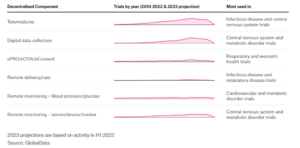We recently published an eBook about decentralized clinical trials. If you want to skip the blog and fast forward to downloading the e-book, click here.
In our new e-Book, Your Blueprint for Decentralized Clinical Trials, we discuss the promises of virtualization in clinical research. There are distinct benefits for sponsors and contract research organizations (CROs), patients and sites.
Decentralized Clinical Trials Benefit Sponsors and CROs
For sponsors and CROs, the benefits are:
- Faster access to higher quality, timely data,
- Acceleration of recruitment, higher retention and a larger pool of potential participants,
- Reduced reliance on sites, utilization of virtual sites and improved site satisfaction,
- Reduced or eliminated source data verification (SDV),
- More efficient and less costly monitoring,
- Automated alerts, e.g., when a patient may be at risk or experiencing an adverse event,
- Improvement in participant and site compliance,
- The ability to obtain real time, actionable study metrics, and
- Decreased overall time to database lock.
I am confident the plethora of decentralized clinical trial benefits for sponsors and CROs helps to explain the expansion of its use.
Decentralized Clinical Trials Uptake and Statistics
The October 2023 update to the Clinical Trials Arena decentralized clinical trials (DCT) tracker found the use of DCTs slowed in 2022 but remained significantly higher than in 2020. DCT volume is expected to rise by 17 percent by the end of 2023, exceeding peak activity in 2021 during the COVID-19 pandemic.
The recent Clinical Trials Arena update also included interesting insights into uptake by disease area and DCT tactic:
- Digital Data Collection: With 296 trials initiated during 2022, this is the fastest growing form of DCT. Since the beginning of 2020, 1.6 percent of trials have utilized digital data collection.
- Telemedicine: Overall, 2.9 percent of new trials have used telemedicine since the beginning of 2020, but more than five percent of new infectious disease trials used the tactic.
- Remote Monitoring of Blood Pressure and Glucose Levels: A decade ago, this was the most common form of DCT. Since the start of 2020, 0.6 percent of trials have used remote monitoring of blood pressure and glucose levels whereas close to six percent of new trials for metabolic disorders have used it.
- Remote Monitoring Using Sensors, Trackers and Devices: 1.2 percent of all new studies have utilized remote monitoring with sensors, devices and trackers since the outset of 2020.
- ePRO/eCOA/eConsent: 0.7 percent of new studies since 2020 have used ePRO, eCOA and/or eConsent. By specialty, respiratory and women’s health studies lead in the usage of ePRO, eCOA and/or eConsent.
- Decentralization to Home or Alternative Sites: Since the beginning of 2020, 0.2 percent of new health trials used decentralization to home or alternative sites, which includes remote drug delivery and home nursing.

Decentralized clinical trials also deliver benefits to patients and sites.
For patients, there is reduced or eliminated travel, enhanced opportunities for participation, increased safety by mitigating disease exposure, the ability to engage with clinical staff when and where they are most comfortable and the alleviation of the burden for patients with limited mobility or extreme illness.
For sites, DCT benefits include:
- Access to a larger pool of patients,
- Faster enrollment via streamlined remote screening and selection,
- Increased patient engagement and retention, and
- Principal investigators and clinical care teams can work remotely, obtain data from patients faster and automate the trials day-to-day activities without onsite visits.
In the eBook, we discuss the key capabilities needed in an electronic data capture (EDC) platform to support trial virtualization as well as the EDC benefits by stakeholder: sites, participants, sponsors, data managers and study admins, monitors, and developers and partners.
To learn much more about decentralized clinical trials, download the eBook now.

